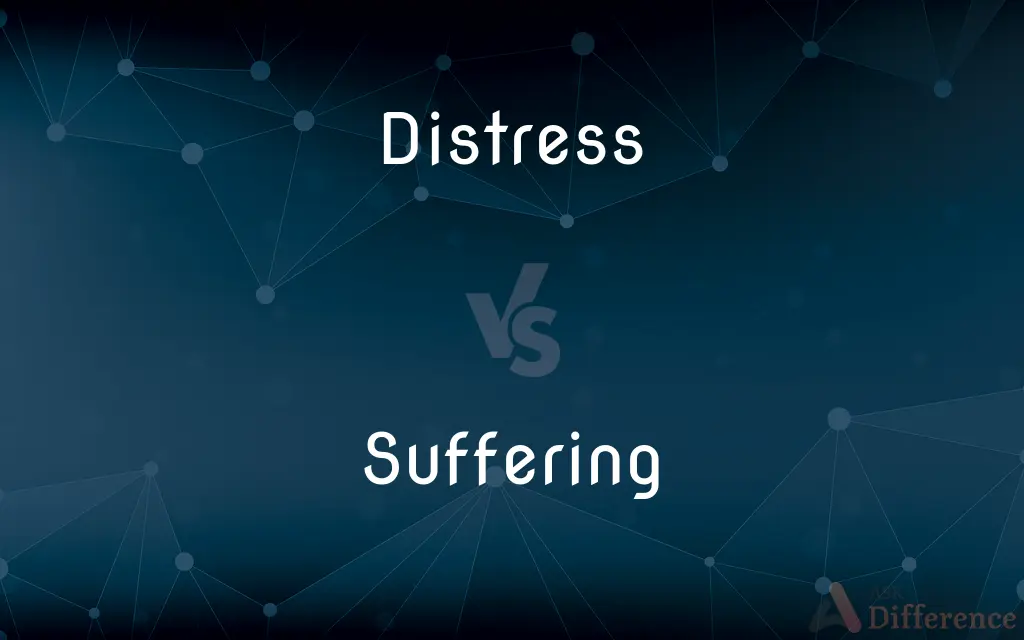Distress vs. Suffering — What's the Difference?
By Tayyaba Rehman & Fiza Rafique — Published on October 17, 2023
Distress refers to extreme anxiety, sorrow, or pain, while suffering encompasses enduring pain, hardship, or distress over a prolonged period.

Difference Between Distress and Suffering
Table of Contents
ADVERTISEMENT
Key Differences
Distress is a term that primarily denotes immediate reactions to harmful situations, stressors, or traumatic events. It highlights moments of extreme anxiety, sorrow, or pain that a person might experience in response to specific incidents. On the other hand, suffering is broader in its scope and often signifies the process of undergoing pain, hardship, or distress for an extended period.
While both distress and suffering indicate unfavorable situations or feelings, distress generally has a sense of immediacy and is often a direct response to a particular event or circumstance. For instance, receiving bad news can cause distress. Suffering, however, often implies a prolonged state of pain or discomfort, whether mental, physical, or emotional. An ongoing illness, for example, may lead to suffering.
In some contexts, distress can be seen as a subset of suffering. One might experience distress as a part of the overall experience of suffering, but not all distress leads to prolonged suffering. Similarly, suffering encompasses more than just distress; it might include elements of despair, hopelessness, and chronic pain.
Ultimately, while both terms revolve around negative experiences, their main distinction lies in duration and context. Distress is more immediate and reactive, while suffering indicates a more extended, ongoing experience of pain or hardship.
Comparison Chart
Primary Definition
Immediate reaction to harmful situations or events.
Undergoing pain, hardship, or distress over a prolonged period.
ADVERTISEMENT
Duration
Short-term, momentary.
Can be long-term, persistent.
Causes
Specific incidents, stressors, or traumatic events.
Ongoing situations, chronic conditions, or enduring hardships.
Scope
Specific, immediate reactions.
Broader, encompassing various forms of pain or distress.
Emotional Depth
Extreme anxiety, sorrow, or pain.
Can range from mild discomfort to deep despair and pain.
Compare with Definitions
Distress
Extreme anxiety, sorrow, or pain.
The sudden loss caused her immense distress.
Suffering
The state of undergoing pain, distress, or hardship.
Many undergo unimaginable suffering during wars.
Distress
Mental pain or anguish.
His unkind words caused her much distress.
Suffering
A negative experience that affects the body, mind, or soul.
The community aimed to alleviate the suffering of the less fortunate.
Distress
A state of adversity or difficulty.
Financial distress can lead to various other problems.
Suffering
Mental or emotional anguish.
After the betrayal, she went through a lot of suffering.
Distress
A negative reaction to a specific event or situation.
The loud noise caused immediate distress to the baby.
Suffering
Prolonged pain or discomfort.
His chronic illness caused him years of suffering.
Distress
The act or state of being stressed or strained.
The ship was in distress after the storm.
Suffering
An enduring state of adversity.
The people expressed their suffering through art and music.
Distress
To cause strain, anxiety, or suffering to.
Suffering
The condition of one who suffers; the bearing of pain or distress.
Distress
To mar or otherwise treat (an object or fabric, for example) to give the appearance of an antique or of heavy prior use.
Suffering
An instance of pain or distress.
Distress
(Archaic) To constrain or overcome by harassment.
Suffering
Experiencing pain; characterized by suffering.
Distress
Anxiety or mental suffering.
Suffering
The condition of someone who suffers; a state of pain or distress.
Distress
Bodily dysfunction or discomfort caused by disease or injury
Respiratory distress.
Suffering
Present participle of suffer
Distress
Physical deterioration, as of a highway, caused by hard use over time
Pavement distress.
Suffering
The bearing of pain, inconvenience, or loss; pain endured; distress, loss, or injury incurred; as, sufferings by pain or sorrow; sufferings by want or by wrongs.
Distress
The condition of being in need of immediate assistance
A motorist in distress.
Suffering
Being in pain or grief; having loss, injury, distress, etc.
Distress
Suffering caused by poverty
Programs to relieve public distress.
Suffering
A state of acute pain
Distress
(Law) The act of distraining or seizing goods to compel payment or other satisfaction for a debt or other duty owed; distraint.
Suffering
Misery resulting from affliction
Distress
Physical or emotional discomfort, suffering, or alarm, particularly of a more acute nature.
Suffering
Psychological suffering;
The death of his wife caused him great distress
Distress
A cause of such discomfort.
Suffering
Feelings of mental or physical pain
Distress
Serious danger.
Suffering
Troubled by pain or loss;
Suffering refugees
Distress
(medicine) An aversive state of stress to which a person cannot fully adapt.
Suffering
Very unhappy; full of misery;
He felt depressed and miserable
A message of hope for suffering humanity
Wretched prisoners huddled in stinking cages
Distress
(legal) A seizing of property without legal process to force payment of a debt.
Distress
(legal) The thing taken by distraining; that which is seized to procure satisfaction.
Distress
To cause strain or anxiety to someone.
Distress
(legal) To retain someone’s property against the payment of a debt; to distrain.
Distress
To treat a new object to give it an appearance of age.
A pair of distressed jeans
She distressed the new media cabinet so that it fit with the other furniture in the room.
Distress
Extreme pain or suffering; anguish of body or mind; as, to suffer distress from the gout, or from the loss of friends.
Not fearing death nor shrinking for distress.
Distress
That which occasions suffering; painful situation; misfortune; affliction; misery.
Affliction's sons are brothers in distress.
Distress
A state of danger or necessity; as, a ship in distress, from leaking, loss of spars, want of provisions or water, etc.
Distress
The act of distraining; the taking of a personal chattel out of the possession of a wrongdoer, by way of pledge for redress of an injury, or for the performance of a duty, as for nonpayment of rent or taxes, or for injury done by cattle, etc.
If he were not paid, he would straight go and take a distress of goods and cattle.
The distress thus taken must be proportioned to the thing distrained for.
Distress
To cause pain or anguish to; to pain; to oppress with calamity; to afflict; to harass; to make miserable.
We are troubled on every side, yet not distressed.
Distress
To compel by pain or suffering.
Men who can neither be distressed nor won into a sacrifice of duty.
Distress
To seize for debt; to distrain.
Distress
Psychological suffering;
The death of his wife caused him great distress
Distress
A state of adversity (danger or affliction or need);
A ship in distress
She was the classic maiden in distress
Distress
Extreme physical pain;
The patient appeared to be in distress
Distress
The seizure and holding of property as security for payment of a debt or satisfaction of a claim;
Originally distress was a landloard's remedy against a tenant for unpaid rents or property damage but now the landlord is given a landlord's lien
Distress
Cause mental pain to;
The news of her child's illness distressed the mother
Common Curiosities
Can suffering be mental?
Yes, suffering can manifest as mental anguish or emotional pain.
Can distress lead to suffering?
Yes, if distressing events or feelings persist, they can lead to suffering.
Can suffering lead to growth?
Yes, many believe in the concept of post-traumatic growth where individuals grow from their suffering.
Is distress always negative?
Generally, distress is seen as a negative or adverse reaction.
Is distress a type of suffering?
It can be seen as a subset or a form of suffering but is not synonymous.
Is suffering always emotional?
No, suffering can be physical, mental, or emotional.
Is distress short-lived?
Typically, distress is immediate and momentary, though it can persist in some cases.
Is there a positive side to distress?
Sometimes, distress can be a warning sign or catalyst for necessary change.
Are distress and suffering synonymous?
They are related but not synonymous; distress is immediate, while suffering is prolonged.
How can one alleviate suffering?
Approaches vary, but therapy, medicine, support, and lifestyle changes can help.
Can animals experience distress and suffering?
Yes, animals can experience both physical pain and emotional distress.
Can positive events cause distress?
Yes, overwhelming positive events, like winning a lottery, can cause distress due to sudden change.
Can suffering be quantified?
It's subjective and varies by individual, making it challenging to quantify universally.
Which is worse: distress or suffering?
Neither is universally "worse," but suffering often denotes a more prolonged, deeper experience.
Can suffering be silent?
Absolutely, many people suffer silently without expressing their pain outwardly.
Share Your Discovery

Previous Comparison
Norms vs. Values
Next Comparison
Central Bank vs. Commercial BankAuthor Spotlight
Written by
Tayyaba RehmanTayyaba Rehman is a distinguished writer, currently serving as a primary contributor to askdifference.com. As a researcher in semantics and etymology, Tayyaba's passion for the complexity of languages and their distinctions has found a perfect home on the platform. Tayyaba delves into the intricacies of language, distinguishing between commonly confused words and phrases, thereby providing clarity for readers worldwide.
Co-written by
Fiza RafiqueFiza Rafique is a skilled content writer at AskDifference.com, where she meticulously refines and enhances written pieces. Drawing from her vast editorial expertise, Fiza ensures clarity, accuracy, and precision in every article. Passionate about language, she continually seeks to elevate the quality of content for readers worldwide.















































